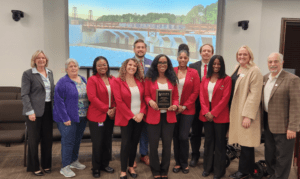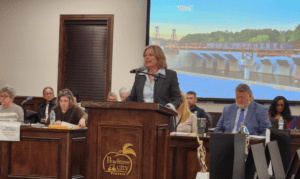Peachtree City Councilwoman Kim Learnard took a few seconds at the end of Thursday’s council meeting to highlight information compiled on the regional Transportation Special Purpose Local Option Sales Tax (T-SPLOST) that is posted on the city’s website.
While Learnard said she was not advocating one way or the other about the proposed 10-year levy because she feels it’s a decision up to voters, Councilman George Dienhart pointed that that 52 percent of the funds are going for mass transit, which he said has made the project list “controversial.”
“Had this been split into two referendums, perhaps we could have passed a road referendum while voting down a mass transit referendum,” Dienhart said. “I will be voting against it and that’s all I’m going to say about it.”
While half of the estimated $7.2 billion revenue in the 10-county metro area is earmarked for transit, there are no transit projects included for Fayette County, which is far less urban than most of the other counties. Fayette is one of the few metro Atlanta counties that has shunned mass transit, specifically in the form of commuter buses which require significant investment from county governments.
Learnard, noting that the fact sheet on the city’s website was compiled by Fayette County’s engineering department, said there has been a tremendous amount of discussion about the T-SPLOST election even though residents aren’t picking a candidate in that race. It’s a yes-or-no vote, giving a thumbs up or thumbs down on the proposed tax.
One of the more glaring issues with the T-SPLOST is the fact that Fayette won’t have as much “say” in the final result, because the results will be aggregated among all 10 counties. Which means that even if the T-SPLOST fails in Fayette County but wins a majority in the final 10-county tally, the tax will be assessed here for a 10-year period.
Peachtree City commuters are most likely to be impacted by a T-SPLOST project that is outside Fayette County: the traffic choke point at the interchange of Ga. Highway 74 and Interstate 85 in Fairburn. If the T-SPLOST is approved, a project is planned to add significant capacity for vehicles by use of cloverleaf approaches with construction of a new bridge. If the tax isn’t approved, the Georgia Department of Transportation still has money planned to remake the interchange with a diverging diamond design to improve traffic flow by eliminating left turns.
Other Peachtree City projects on the list include the completion of MacDuff Parkway which would connect it from its current terminus northward to Ga. Highway 74 at Kedron Drive. That road was initially supposed to be built by developers, but it has stalled several years ago when the housing market stalled.
Also on the list are two cart path projects in Peachtree City totaling $2.36 million. One would connect the southern end of the industrial park to an existing bridge and path over Flat Creek that links to homes on the south end of the city; this path would travel southward from the bridge to a tunnel underneath Ga. Highway 74 and then northward on the western side of Hwy. 74 all the way up to Dividend Drive, linking Cooper Lighting, Sany America, Sigvaris and more businesses to the path system.
The other path project would also originate at the Flat Creek bridge, but it would extend northward behind a number of businesses in the industrial park including Panasonic and Hoshizaki, ending at Crossdown Drive.
Other significant projects of note proposed for Fayette County include the widening of Ga. Highway 54 east of Fayetteville from two to four lanes; widening of Ga. Highway 92 south of Fayetteville from two to four lanes; and widening of Ga. Highway 85 south of Fayetteville from Grady Avenue to Bernhard Road.
The other major project on the list is the East Fayetteville Bypass, which would begin north of the Fayette Pavilion at Corinth Road, crossing Ga. Highway 54 and linking to County Line Road with a terminus at the intersection of County Line, Inman and South Jeff Davis Drive.
The project list was created by 21 local elected officials throughout metro Atlanta. Fayette’s representatives during that process were County Commission Chairman Herb Frady and then-Fayetteville Mayor Ken Steele.
The city is also slated to get some $10.4 million over the 10-year life of the tax to spend on local projects of the city’s choosing. The informal plan is for the city to use those funds on its annual road resurfacing and repair budget.
Such unrestricted local funds will also be heading to other local governments in Fayette County if the tax passes regionwide, including:
Unincorporated Fayette County, $26.48 million;
Fayetteville, $5.03 million;
Tyrone, $2.98 million;
Brooks, $543,000; and
Woolsey $105,000.
If the T-SPLOST is not approved, Fayette and the nine other counties in the region will have to pay a higher percentage of state-funded road projects, as the amount would increase from 20 percent to 30 percent.











Leave a Comment
You must be logged in to post a comment.